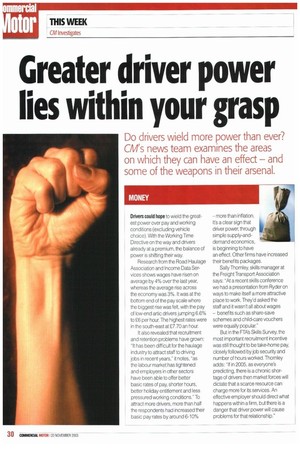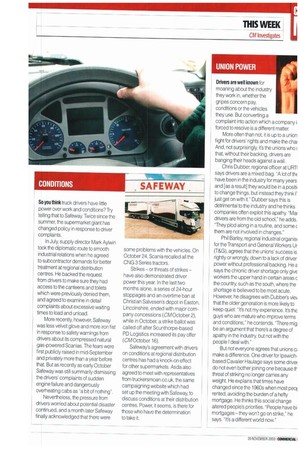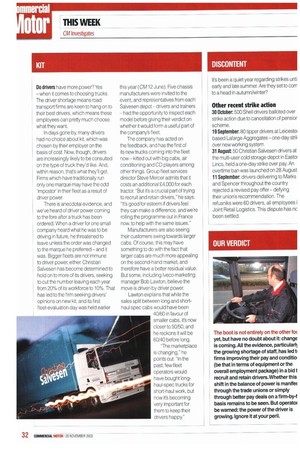Greater driver power lies within your grasp
Page 30

Page 31

Page 32

If you've noticed an error in this article please click here to report it so we can fix it.
Do drivers wield more power than ever?
CM's news team examines the areas on which they can have an effect — and some of the weapons in their arsenal.
MONEY
Drivers could hope to wield the greatest power over pay and working conditions (excluding vehicle choice). With the Working Time Directive on the way and drivers already at a premium, the balance of power is shifting their way.
Research from the Road Haulage Association and Income Data Services shows wages have risen on average by 4% over the last year, whereas the average rise across the economy was 3%. It was at the bottom end of the pay scale where the biggest rise was felt, with the pay of low-end artic drivers jumping 6.6% to £6 per hour. The highest rates were in the south-east at £7.70 an hour.
It also revealed that recruitment and retention problems have grown: "It has been difficult for the haulage industry to attract staff to driving jobs in recent years," it notes, "as the labour market has tightened and employers in other sectors have been able to offer better basic rates of pay, shorter hours, better holiday entitlement and less pressured working conditions." To attract more drivers, more than half the respondents had increased their basic pay rates by around 6-10% more than inflation. It's a clear sign that driver power, through simple supply-anddemand economics, is beginning to have an effect. Other firms have increased their benefits packages.
Sally Thornley, skills manager at the Freight Transport Association says: "At a recent skills conference we had a presentation from Ryder on ways to make itself a more attractive place to work. They'd asked the staff and it wasn't all about wages benefits such as share-save schemes and child-care vouchers were equally popular."
But in the FTA's Skills Survey, the most important recruitment incentive was still thought to be take-home pay, closely followed by job security and number of hours worked. Thorn ley adds: "If in 2005, as everyone's predicting, there is a chronic shortage of drivers then market forces will dictate that a scarce resource can charge more for its services. An effective employer should direct what happens within a firm, but there is a danger that driver power will cause problems for that relationship."
CONDITIONS
So you think truck drivers have little power over work and conditions? Try telling that to Safeway. Twice since the summer, the supermarket giant has changed policy in response to driver complaints.
In July, supply director Mark Aylwin took the diplomatic route to smooth industrial relations when he agreed to subcontractor demands for better treatment at regional distribution centres. He backed the request from drivers to make sure they had access to the canteens and toilets which were previously denied them, and agreed to examine in detail complaints about excessive waiting times to load and unload.
More recently, however, Safeway was less velvet glove and more iron fist in response to safety warnings from drivers about its compressed natural gas-powered Scan ias. The fears were first publicly raised in mid-September and privately more than a year before that. But as recently as early October Safeway was still summarily dismissing the drivers' complaints of sudden engine failure and dangerously overheating cabs as "a bit of nothing".
Nevertheless, the pressure from drivers worried about potential disaster continued, and a month later Safeway finally acknowledged that there were some problems with the vehicles. On October 24, Scania recalled all the CNG 3 Series tractors.
Strikes or threats of strikes have also demonstrated driver power this year. In the last two months alone, a series of 24-hour stoppages and an overtime ban at Christian Salvesen's depot in Easton, Lincolnshire, ended with major company concessions (CM October 2), while in October, a strike ballot was called off after Scunthorpe-based PD Logistics increased its pay offer (CM October 16).
Safeway's agreement with drivers on conditions at regional distribution centres has had a knock-on effect for other supermarkets. Asda also agreed to meet with representatives from truckersmoan.co.uk, the same campaigning website which had set up the meeting with Safeway, to discuss conditions at their distribution centres. Power, it seems, is there for those who have the determination to take it. Drivers are well known for moaning about the industry they work in, whether the gripes concern pay, conditions or the vehicles they use. But converting a complaint into action which a company forced to resolve is a different matter.
More often than not, it is up to a union fight for drivers' rights and make the chai And, not surprisingly, it's the unions who that, without their backing, drivers are banging their heads against a wall.
Chris Dubber, regional officer at URTI says drivers are a mixed bag. "A lot of thc have been in the industry for many years and [as a result] they would be in a positil to change things, but instead they think l' just get on with it." Dubber says this is detrimental to the industry and he thinks companies often exploit this apathy. "Mai drivers are from the old school," he adds. "They plod along in a routine, and some c them are not involved in changes."
Phil Barley, regional industrial organist for the Transport and General Workers Ur (T&G), agrees that the unions success is rightly or wrongly, down to a lack of driver power without professional backing. He a says the chronic driver shortage only give workers the upper hand in certain areas c the country, such as the south, where the shortage is believed to be most acute. However, he disagrees with Dubber's via, that the older generation is more likely to keep quiet: "It's not my experience. It's the guys who are mature who improve terms and conditions," he contends. "There mig be an argument that there's a degree of apathy in the industry, but not with the people I deal with."
But not everyone agrees that unions make a difference. One driver for Ipswichbased Cavalier Haulage says some drivel do not even bother joining one because tlthreat of striking no longer carries any weight. He explains that times have changed since the 1960s when most pal rented, avoiding the burden of a hefty mortgage. He thinks this social change altered people's priorities. "People have bi mortgages they won't go on strike," he says. "It's a different world now"
KIT
Do drivers have more power? Yes when it comes to choosing trucks. The driver shortage means road transport firms are keen to hang on to their best drivers, which means these employees can pretty much choose what they want.
In days gone by, many drivers had no choice about kit, which was chosen by their employer on the basis of cost. Now, though, drivers are increasingly likely to be consulted on the type of truck they'd like. And, within reason, that's what they'll get. Firms which have traditionally run only one marque may have the odd 'impostor' in their fleet as a result of driver power.
There is anecdotal evidence, and we've heard of driver power coming to the fore after a truck has been ordered. When a driver for one small company heard what he was to be driving in future, he threatened to leave unless the order was changed to the marque he preferred and it was. Bigger fleets are not immune to driver power, either. Christian Salvesen has become determined to hold on to more of its drivers, seeking to cut the number leaving each year from 20% of its workforce to 10%. That has led to the firm seeking drivers' opinions on new kit, and its first fleet-evaluation day was held earlier this year (CM12 June). Five chassis manufacturers were invited to the event, and representatives from each Salvesen depot drivers and trainers had the opportunity to inspect each model before giving their verdict on whether it would form a useful part of the company's fleet.
The company has acted on the feedback, and has the first of its new trucks coming into the fleet now kitted out with big cabs, air conditioning and CD players among other things. Group fleet services director Steve Mercer admits that it costs an additional £4,000 for each tractor. But it's a crucial part of trying to recruit and retain drivers," he says. "Its good for esteem if drivers feel they can make a difference, and we're rolling the programme out in France now, to help with the same issues."
Manufacturers are also seeing their customers swing towards larger cabs. Of course, this may have something to do with the fact that larger cabs are much more appealing on the second-hand market, and therefore have a better residual value. But some, including Iveco marketing manager Bob Lawton, believe the move is driven by driver power.
Lawton explains that while the sales split between long and shorthaul spec cabs would have been 40/60 in favour of smaller cabs, it's now closer to 50/50, and he reckons it will be 60/40 before long.
"The marketplace is changing," he points out. "In the past, few fleet operators would have bought longhaul-spec trucks for short-haul work, but now its becoming very important for them to keep their drivers happy."
DISCONTENT
It's been a quiet year regarding strikes unti early and late summer. Are they set to corn to a head in autumn/winter?
Other recent strike action
30 October: 500 Shell drivers balloted over strike action due to cancellation of pensior scheme.
19 September 80 tipper drivers at Leicesto based Lafarge Aggregates -one-day &Vip over new working system.
31 August: 50 Christian Salvesen drivers at the multi-user cold storage depot in Easta Lincs, held a one-day strike over pay. An overtime ban was launched on 28 August 11 September: drivers delivering to Marks and Spencer throughout the country rejected a revised pay offer defying their union's recommendation. The ref usniks were 60 drivers, all employees i Joint Retail Logistics. This dispute has nc been settled.
































































































































































































